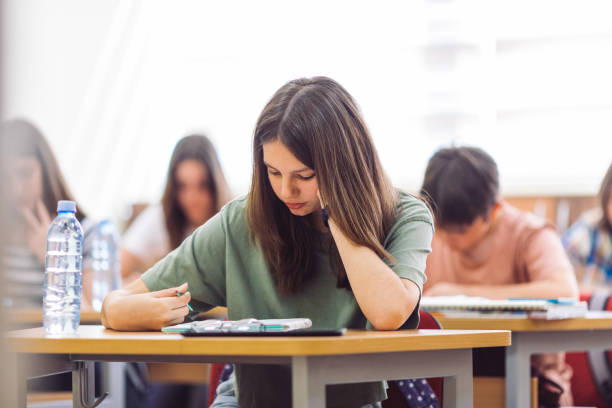Your school or institution may frequently provide you with a series of mock exams to help you prepare for major exams like GCSEs and A-Levels. These mock exams are designed to be similar to real examinations so you can familiarize yourself with how they work. It should be an opportunity to become acquainted with aspects such as question style and time management under exam settings.
Many individuals worry if these mock exams are truly representative of the real exam. There is also the belief that mock exams are intended to be more difficult than the actual exam, so that when the real one comes, you find it simpler. You may be wondering if this is true.
Unfortunately, this question does not have a straightforward answer. Mocks are not universally same and are determined by your school or college. As a result, they choose how difficult your mocks will be – and they are unlikely to inform you ahead of time!
Many people have stated that mock exams were more difficult than their real ones. However, schools may believe that mock exams should be as similar to real exams as possible, therefore they should not be significantly more difficult.
While this has given you a basic summary, there is much more to discuss. Continue reading to learn more about how difficult mock examinations are, how well they prepare you for real GCEs exams, and other details.
Table of contents
What is The Purpose of Mock GCSEs
Mock General Certificate of Education (GCE) exams serve a vital role in the educational journey of students.
These practice examinations are designed to simulate the conditions and challenges of the actual GCEs, providing students with a valuable tool to enhance their preparedness and increase their chances of success.
Here, we will explain the primary purposes of mock GCE exams. They include:
1. Assessment of Knowledge and Skills
One of the fundamental purposes of mock GCEs is to assess a student’s grasp of the subject matter and their ability to apply what they have learned. These exams allow students to gauge their strengths and weaknesses in specific topics or subjects.
2. Familiarization with Exam Format
Mock GCEs replicate the format and structure of the official GCE exams, including the types of questions, time constraints, and instructions. This familiarity helps students become more comfortable with the exam environment, reducing anxiety on the actual exam day.
3. Time Management and Exam Strategies
GCE exams often come with strict time limits. Mock exams provide an opportunity for students to practice time management and develop effective exam strategies, such as which questions to tackle first and how to allocate time wisely.
4. Identifying Areas for Improvement
By taking mock GCEs, students can identify specific areas where they need improvement. This targeted feedback enables them to focus their revision efforts on weaker subjects or skills, ultimately boosting their overall performance.
See also: What Happens If You Miss A Mock Exam?
5. Building Confidence
Success in mock exams can boost a student’s confidence, motivating them to perform well in the actual GCEs.
Conversely, facing challenges in mock exams can serve as a wake-up call, prompting students to seek additional support or resources.
6. Reduction of Exam Anxiety
The fear of the unknown can be a significant source of exam anxiety. Mock GCEs alleviate this anxiety by providing a realistic preview of what students can expect during the official exams.
As a result, students tend to approach the GCEs with more confidence and composure.
7. Teacher and School Evaluation
Mock GCEs also benefit educators and schools. They help teachers identify areas where students as a group may need additional instruction or clarification.
Schools can use this data to tailor their teaching strategies and curriculum accordingly.
See also: When Do You Do Your Year 11 GCSE Mock Exams?
Are There Any Significant Difference Between Question Types In Mock Exams And Real GCEs
The distinction between mock exams and real General Certificate of Education (GCE) exams extends beyond the format and environment. It also encompasses content and question types.
These differences are essential for students to understand as they prepare for their official GCEs. What are these differences?
1. Content Variability:
- Breadth vs. Depth: Mock exams may sometimes cover a broader range of topics within a subject, while real GCEs tend to delve deeper into specific areas. Therefore, students should expect a more comprehensive content review in mock exams.
- Specific Topics: Real GCEs might include questions on topics that were not covered in mock exams. Students should be prepared for unexpected content in the official exams.
2. Question Types:
- Complexity: Mock exams often feature questions of varying complexity levels, while real GCEs can include more intricate and nuanced questions that demand a deeper understanding of the subject matter.
- Application-Based Questions: Official GCEs may include more application-based questions that require students to apply their knowledge to real-world scenarios. Mock exams might focus more on straightforward factual recall.
- Essay and Extended Response Questions: Depending on the subject, real GCEs may include essay questions or extended response items that necessitate in-depth analysis and critical thinking. These types of questions are sometimes less common in mock exams.
3. Question Format:
- Question Style: Mock exams may mimic a particular style of questioning that differs from the official GCEs. Real GCEs can have unique question formats or adaptations of existing ones, challenging students to adapt quickly.
- Multiple-Choice Variability: While both mock exams and GCEs include multiple-choice questions, the official exams may feature more sophisticated multiple-choice formats, such as “select all that apply” or “matching” questions.
See also: How Important Are Year 10 Mocks?
4. Exam Length and Timing:
- Timing Constraints: Real GCEs are strictly timed, and students must manage their time effectively. Mock exams may be less stringent in this regard. Practicing under strict time constraints is crucial to success in official exams.
5. Grading and Scoring:
- Rigor in Grading: Real GCEs adhere to standardized, rigorous grading criteria. Mock exams may not be as stringent in grading, potentially leading to variations in perceived difficulty.
6. Evolving Exam Patterns:
- Changes Over Time: GCE exam boards may update the format and content of their exams periodically. Mock exams might not always reflect the latest changes, so students should stay informed about any updates.
See also: Are A Level Mocks Important?
Are Mock Exams Harder Than GCEs
The question of whether mock General Certificate of Education (GCE) exams are harder than real GCEs is a topic of frequent debate among students, educators, and parents.
The answer to this question can vary widely depending on several factors. They include:
1. Purpose and Intention:
Mock GCEs are typically designed to prepare students for the rigor of the real GCEs. As a result, they may intentionally be made challenging to ensure students are well-prepared.
Real GCEs, on the other hand, are standardized exams designed to assess a student’s knowledge and skills objectively. Their level of difficulty is determined by the exam boards and their adherence to established grading criteria.
2. Variation Among Mock Exams:
The difficulty of mock GCEs can vary significantly from one provider to another or even among different mock exams offered by the same institution. Some mock exams might indeed be harder than others.
3. Timing and Preparation:
Mock GCEs are usually taken as part of a student’s preparation process. Students may not be as well-prepared for mock exams as they are for the official GCEs. This perception of difficulty could stem from differences in preparation levels.
See also: How Helpful is doing Mock Trial in College to a Law School Admission?
4. Content and Format Changes:
Real GCEs can change content or format over time. If mock exams do not align closely with the most recent GCE specifications, students might perceive them as harder or easier than the real GCEs.
5. Subjectivity and Individual Experience:
A student’s perception of difficulty can be highly subjective and influenced by their strengths, weaknesses, and study strategies.
Some students may find specific mock exams more challenging due to differences in question styles or content coverage that do not align with their strengths.
6. Psychological Factors:
Anxiety, stress, and other psychological factors can affect a student’s perception of exam difficulty. The pressure associated with real GCEs can make them seem harder, even if the content is similar to mock exams.
See also: Do Universities Prefer IGCSEs or GCSEs?
How Can Students Incorporate Mock Exams Effectively For GCEs Exams
Mock exams are valuable resources that can significantly enhance a student’s preparation for their General Certificate of Education (GCE) exams.
When used strategically, mock exams can help students identify strengths and weaknesses, improve time management skills, and build confidence.
Here are some key ways students can use mock exams effectively in their GCE exam preparation:
1. Early Assessment and Benchmarking
Take an initial mock exam early in your preparation to assess your current knowledge and skills. Use this baseline to benchmark your progress throughout your study period.
2. Identify Weaknesses
Analyze the results of your mock exams to identify areas where you struggle or consistently perform poorly. Focus your study efforts on these weak areas to improve your overall performance.
3. Simulate Exam Conditions
Replicate the exam environment as closely as possible during mock exams. Sit in a quiet room, time yourself, and adhere to all exam rules. This helps you become comfortable with the real exam setting, reducing anxiety on the actual exam day.
4. Effective Time Management
Practice time management skills during mock exams by allocating a specific amount of time to each section or question. Learn to move on if you get stuck on a challenging question to ensure you complete the entire exam within the time limit.
5. Review and Analyze
After taking a mock exam, thoroughly review your answers. Understand why you got certain questions wrong and learn from your mistakes. Take notes on concepts or topics that you need to revisit for further study.
See also: GCSE 2024: Why I need to write a GCSE in 2024
6. Variety of Mock Exams
Use a variety of mock exams from different sources if possible. Different mock exams may cover different aspects of the syllabus and provide a well-rounded preparation experience.
7. Progressive Testing
As your preparation progresses, take additional mock exams to track your improvement. Aim for consistency in your performance and a gradual increase in your scores.
8. Simulate Real Exam Timings
Closer to the actual GCEs, take full-length mock exams under timed conditions. This will help you adapt to the strict timing of the real exams.
9. Stay Calm and Build Confidence
Use mock exams not only to improve your knowledge but also to build confidence in your abilities. Remind yourself that mock exams are part of your preparation journey and not the final measure of your success.
10. Seek Guidance and Feedback
If available, consult with teachers or mentors to discuss your mock exam performance. They can provide valuable insights and suggest study strategies tailored to your needs.
11. Repeat the Process
Continue to cycle through this process of assessment, review, and improvement as you approach your GCE exams.
See also: How Many GCSEs Do You Need For University? | 2024
Frequently Asked Questions
The difficulty of mock exams compared to real GCEs can vary. Mock exams aim to prepare students and may differ in content, format, or complexity.
Mock exams might cover a wider range of topics or emphasize different skills, making them seem tougher. They also serve to prepare students for real exam pressure.
Real GCEs may present unfamiliar questions or scenarios, contributing to their perceived difficulty. Mock exams may not replicate these unique challenges.
Facing tougher mock exams helps students build resilience, adaptability, and deeper subject knowledge, ultimately boosting confidence for the real GCEs.
While mock exam scores are valuable, the emphasis should be on learning and improvement. Mock exams are tools to identify weak areas and enhance preparation.
Conclusion
The debate over whether mock exams are harder than real GCEs is complex in nature. While mock exams serve as vital tools for preparation, they may differ in content, format, or complexity.
However, they are designed to equip students with the skills, confidence, and adaptability needed to excel in the actual GCEs. Ultimately, it’s not a matter of which is harder, but how effectively students use both experiences to succeed in their educational journey.
References
- thinkstudent.co.uk – Are mocks harder than GCEs.
- thestudentroom.co.uk – Are mocks harder than GCEs.
Recommendations
- 15 Ways To Cope With A-Level Exam Stress (That Actually Work)
- What Are GCSE Mock Exams? Your Ultimate Guide for GCSE and A-Level
- How to Sit For GCSE Exams Privately: The Extensive Guide
- Are GCSEs (Actually) Hard? Top Tips for Passing the Most Difficult GCSE Exam Papers
- Top 10 Hardest University Degrees in the UK | 2024 Ranking






